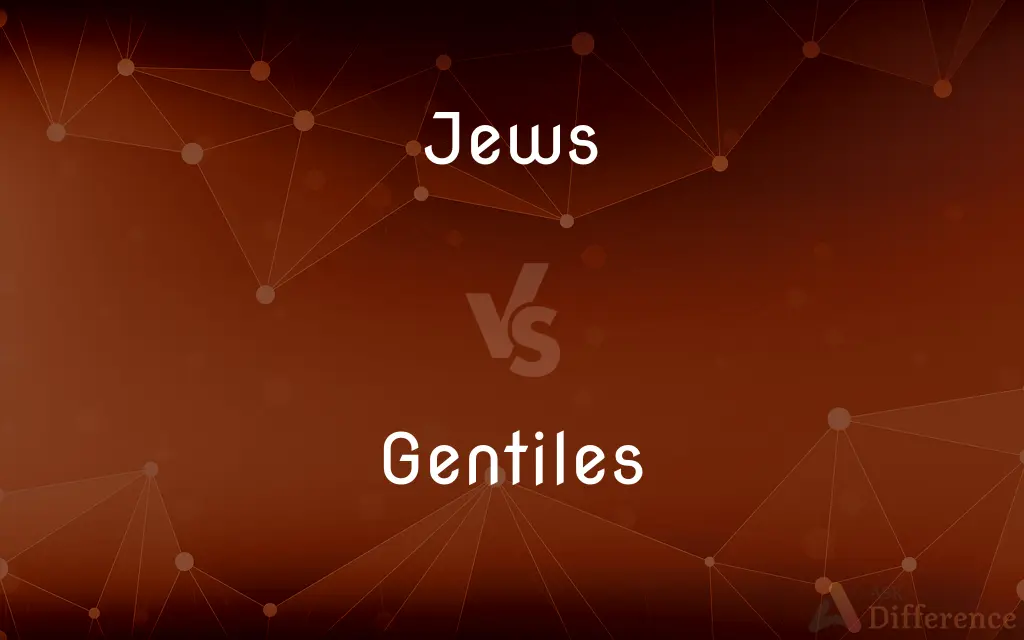Jews vs. Gentiles — What's the Difference?
By Fiza Rafique & Maham Liaqat — Published on March 9, 2024
Jews are individuals who are part of the Jewish community, either by religion or ethnicity, while Gentiles are people who do not belong to the Jewish faith or ethnic group, encompassing all other populations.

Difference Between Jews and Gentiles
Table of Contents
ADVERTISEMENT
Key Differences
Jews refer to the people traditionally linked to the Hebrews of ancient Israel, identified through their religious practices in Judaism or through ethnic lineage. This identity encompasses a rich cultural and religious heritage, including practices, languages, and a shared history.
Gentiles, in contrast, are defined in Jewish context as those who are not Jewish, covering a vast array of cultures, religions, and ethnicities outside the Jewish community. The term originates from Latin and has been used historically in religious texts to distinguish between Jewish and non-Jewish people.
Religiously, Jews follow Judaism, which is monotheistic and based on the Hebrew Bible. Jewish religious practices and beliefs are centered around the Torah, and they celebrate unique holidays like Passover and Yom Kippur, which hold significant historical and spiritual meaning within the Jewish tradition.
Gentiles, given the broadness of the term, can follow any religion or none at all. Their religious beliefs and practices vary widely, from Christianity and Islam to Buddhism and secular worldviews, reflecting the diversity outside the Jewish community.
The relationship between Jews and Gentiles has been complex throughout history, influenced by religious, social, and political interactions. In many societies, this relationship has evolved, promoting dialogue and understanding between the Jewish community and the broader Gentile population.
ADVERTISEMENT
Comparison Chart
Definition
People of Jewish faith or ethnic descent
Individuals not belonging to the Jewish faith or ethnic group
Origin
Linked to ancient Hebrews and Israel
Term used to refer anyone outside the Jewish community
Religious Texts
Follow the Torah and Hebrew Bible
Follow religious texts pertinent to their own beliefs, if any
Holidays
Celebrate holidays like Passover, Yom Kippur
Celebrate holidays according to their own religious or cultural traditions
Cultural Identity
Shared history, language (Hebrew), and traditions
Diverse cultures, languages, and traditions outside of Judaism
Compare with Definitions
Jews
Members of a religious and ethnic group tracing back to ancient Israel.
He follows the Jewish faith, observing all major Jewish holidays.
Gentiles
Individuals not of Jewish faith or ethnicity.
As a Gentile, she was curious about Jewish religious practices.
Jews
Have a distinct cultural identity.
Jewish communities maintain unique traditions and customs passed down through generations.
Gentiles
Possess varied cultural identities.
Gentiles from different parts of the world have their own unique cultural practices.
Jews
Practice Judaism.
As Jews, they attend synagogue services every Sabbath.
Gentiles
Can follow any religion.
Gentiles may practice Christianity, Islam, or any other religion.
Jews
Share a common heritage.
Jews around the world celebrate Passover to commemorate their ancestors' exodus from Egypt.
Gentiles
Belong to diverse ethnic groups.
Gentiles encompass a wide range of ethnic backgrounds, contributing to global cultural diversity.
Jews
Speak Hebrew among other languages.
Hebrew is a significant language for Jews, used in religious texts and prayers.
Gentiles
Celebrate different holidays.
Gentiles celebrate a variety of holidays depending on their religious or cultural traditions.
Jews
An adherent of Judaism as a religion or culture.
Gentiles
A person who is not Jewish.
Jews
A member of the widely dispersed people originally descended from the ancient Hebrews and sharing an ethnic heritage based on Judaism.
Gentiles
(Archaic) A pagan or heathen.
Jews
A native or inhabitant of the ancient kingdom of Judah.
Gentiles
Often Gentile Of or relating to a gentile.
Jews
Plural of jew
Gentiles
Of or relating to a gens, tribe, or people.
Jews
Nonstandard spelling of Jews
Common Curiosities
Who are considered Gentiles?
Gentiles are individuals who do not belong to the Jewish faith or ethnic group, encompassing all other populations.
Do Jews and Gentiles share any common religious beliefs?
Jews and Gentiles may share common ethical and moral beliefs, but their religious doctrines and practices are distinct.
What defines someone as a Jew?
Someone is defined as a Jew if they are part of the Jewish community, either through religion (Judaism) or through ethnic descent.
Can Gentiles practice Judaism?
Gentiles can convert to Judaism through a process recognized by the Jewish community, thus becoming Jews.
Is the term Gentile derogatory?
The term Gentile is not inherently derogatory but is a neutral term used to differentiate between Jewish and non-Jewish people.
Why is the distinction between Jews and Gentiles important?
The distinction has religious, cultural, and historical significance, affecting social identities, practices, and intercommunity relations.
Can a Jew become a Gentile?
Culturally or ethnically, one cannot change their Jewish ancestry; however, religiously, a Jew may adopt another faith or declare no religious belief, distancing themselves from Judaism.
Do Jews and Gentiles interact differently in various countries?
Yes, the nature of Jewish-Gentile interactions can vary significantly depending on historical, cultural, and social contexts of different countries.
How do Jews view Gentiles?
Views vary widely within the Jewish community, but traditionally, Gentiles are respected as part of the broader human community, with certain religious laws governing interactions.
Are all non-Jewish people Gentiles?
Yes, in the context of Jewish terminology, all non-Jewish people are considered Gentiles.
Do Jewish and Gentile holidays overlap?
While some holiday periods may coincide, Jewish and Gentile holidays are distinct and based on different religious and cultural backgrounds.
Are there cultural exchanges between Jews and Gentiles?
Yes, there have been significant cultural exchanges and influences between Jews and Gentiles throughout history, enriching both communities.
What religions do Gentiles follow?
Gentiles follow a broad spectrum of religions, including Christianity, Islam, Hinduism, Buddhism, or no religion at all.
What role do Jews and Gentiles play in each other’s religious texts?
In Jewish texts, Gentiles are often mentioned in the context of laws and narratives involving non-Jewish nations. In some Gentile religious texts, Jews are referenced in various theological and historical contexts.
How does one convert to Judaism?
Conversion to Judaism involves a formal process of study, commitment to Jewish laws, and rituals, guided by a recognized Jewish authority.
Share Your Discovery

Previous Comparison
Nail Glue vs. Super Glue
Next Comparison
Organic Compound vs. Inorganic CompoundAuthor Spotlight
Written by
Fiza RafiqueFiza Rafique is a skilled content writer at AskDifference.com, where she meticulously refines and enhances written pieces. Drawing from her vast editorial expertise, Fiza ensures clarity, accuracy, and precision in every article. Passionate about language, she continually seeks to elevate the quality of content for readers worldwide.
Co-written by
Maham Liaqat












































